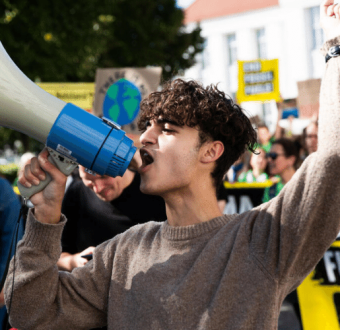A week after the devastating Hurricane Michael tore through places like Mexico Beach and Panama City, several regions of the Florida panhandle are still without electricity days before the midterm elections. On the ballot is a neck-and-neck Senate race, a gubernatorial race that pits Tallahassee mayor Andrew Gillum against Robert DeSantis, a former House representative who has claimed that states have essentially no role to play in combating climate change, and ballot initiative that could ban offshore drilling in state waters.
The beautiful state of Florida with its white sandy beaches, vibrant cities, and biodiverse wetlands has a loaded history with politicians denying climate change and downplaying the urgent environmental threats the state faces. The most glaring example of this is Governor and current Senate candidate Rick Scott banning state agencies — including the freaking Department of Environmental Protection — from using “climate change” or “global warming” in 2015.
Gov. Rick Scott banned the term 'climate change' in Florida. The state was just hit by its worst storm ever. pic.twitter.com/4jwMbG3Q0v
— NowThis (@nowthisnews) October 15, 2018
Any political candidate running for office in Florida must not only include climate change on his or her platform but prioritize it. This should include solid plans to stop new fossil fuel infrastructure, accelerate renewable energy and clean jobs in the state, and mitigate the severe risks climate change poses to the people of Florida. According to the latest analysis from the world’s scientists at the Intergovernmental Panel on Climate Change, we have only a few years to avoid catastrophic climate change which could lead to even more intense superstorms devastating Florida while leaving cities like Miami or Tampa underwater and essentially uninhabitable from sea level rise. The bottom line is that the outcome of the following midterm races could determine the fate of the Sunshine State.
Senate
Current Florida Governor Republican Rick Scott is challenging incumbent Democrat Senator Bill Nelson for one of Florida’s Senate seats. Both candidates have made pledges to keep oil drilling off of Florida’s coasts and although Rick Scott did declare a state of emergency and allocated millions to communities impacted by the state’s toxic algae bloom, which severely impacted marine life, he has also:
- Supported Trump’s bafoonish decision to withdraw the United States from the Paris Climate Agreement.
- Invested in energy companies that warn that action on climate change will hurt profits. Scott is the wealthiest governor in Florida’s history.
- Cut $700 million from the state’s water management programs which may have made the toxic algae bloom even more destructive than they already were.
Senator Nelson has resisted Trump’s attacks on climate action and environmental protections and led on bipartisan legislation to protect Florida’s coast from oil and gas development, yet he still has work to do to be a true climate leader in one of the most impacted states.

The carcass of a Goliath grouper lies on the beach of Gasparilla Island in Boca Grande, Fla. Residents of Southwest Florida are reporting devastating toxic algae bloom stretching across several counties. Fish, sea turtles, pelicans, sharks, and even manatees are washing up dead, and many people are reporting respiratory problems. Florida Governor Rick Scott declared a State of Emergency, but his climate denial and anti-environmental policies are part of the problem.
Gubernatorial
Both candidates for governor, Tallahassee mayor Andrew Gillum, who could become the state’s first African-American governor, and former U.S. representative Ron DeSantis, have talked about climate and environmental issues, but with stark contrast. DeSantis strongly supports Trump and has said that he is “not in the pews of the church of the global warming leftists.” DeSantis has voted against the Department of Defense preparing for climate change, and to reduce environmental analyses for fossil fuel pipelines. And Trump endorses him so there’s that.
Gillum has been vocal about the impact of climate change on Florida and he advocates for accelerating renewable energy in the state. If elected, voters will need to push Gillum to get specific on implementing those policies as quickly as possible.

A man investigates the damage after Hurricane Irma in 2017 — one of the strongest storms ever recorded in the Atlantic — made landfall in the Florida Keys. That was the second major hurricane to hit the United States in under a month, putting the East Coast on the front lines of sea level rise and extreme weather heightened by climate change.
Florida Amendment 9
In addition to candidates, voters will also be faced with voting yay or nay on several amendments in Florida. One we’re watching is Amendment 9 which, if passed, would ban offshore oil and gas drilling in state waters. Unfortunately, this amendment does not apply to the transportation of oil and gas developed outside of state waters, but it’s certainly a start as Trump tries his darndest to open up nearly every United States coast to new oil and gas drilling.
Unsurprisingly, a slew of oil and gas advocacy groups oppose the amendment while several editorial boards across the state and dozens of local environmental groups support voting yes. Immediately halting new fossil fuel development is exactly the kind of action every state should undertake to make progress on climate change.
If you’re a Floridian, you can make a plan to be a climate voter here. And after the midterms, can these young Floridians suing Governor Rick Scott for ignoring climate change prep their 2020 campaigns, please?



